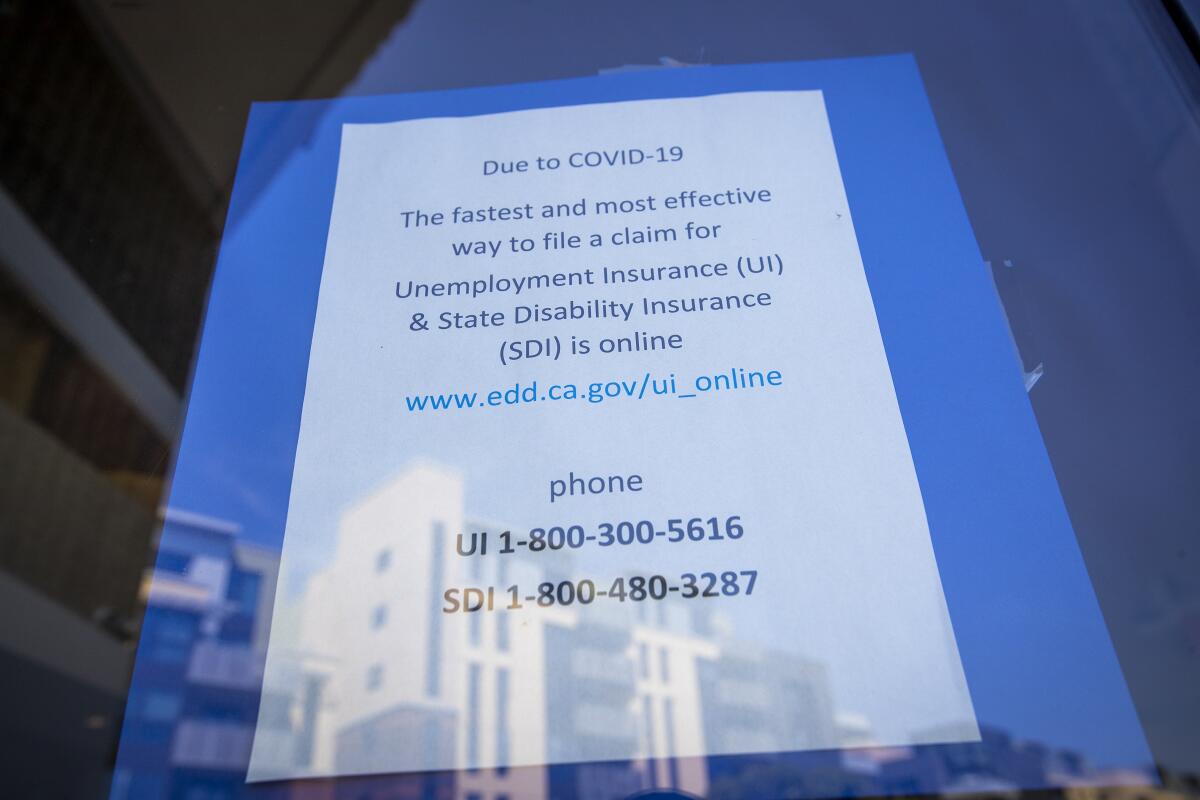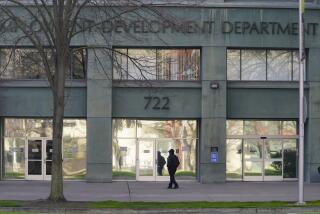Former state employee with record of fraud to plead guilty to EDD scam

- Share via
A former California government employee who once served time in prison for stealing state benefits meant for disabled people has agreed to plead guilty to federal fraud charges for another scam in which she siphoned more than $1.5 million in COVID relief payments.
In a plea agreement filed in U.S. District Court on Wednesday, Gabriela Llerenas, 49, of Perris, admitted to filing bogus jobless claims for pandemic-related benefits with the Employment Development Department, the state agency where she once worked. She now faces up to 20 years in federal prison and has agreed to forfeit $621,000 that she obtained through the scheme, according to the plea agreement.
The guilty plea delivers a significant victory to prosecutors who have been trying to address the widespread fraud that played out as states rushed to disperse billions in COVID relief funds. But with more than $11 billion believed to have been lost to fraudulent claims just in California, the case hardly moves the needle.
The latest scheme follows an earlier one Llerenas ran when she worked at the EDD handling disability insurance claims. She resigned in March 2002 after admitting that she authorized and pocketed fake disability benefits. She was sentenced to 37 months in federal prison, according to court records.
In the current scheme, Llerenas, who also worked as a tax preparer, used the names and social security numbers of former tax clients to apply for emergency unemployment benefits that were part of the Coronavirus Aid, Relief, and Economic Security (CARES) Act that President Biden signed into law in March 2020, according to the plea agreement.
Under the law, business owners, self-employed workers, independent contractors, and others who may not have previously qualified for benefits were eligible to receive payments if the pandemic had impacted their ability to work.
Llerenas admitted that between April and October last year she received payments while posing as out of work cake decorators, waiters, and others. In some cases, she filed the claims without the people knowing and in others she worked in cahoots with the people, the plea agreement said.
When a person was in on the scam with her, Llerenas admitted to charging the person a fee for filing the application. In at least one case, she told the claimant that she was still employed at EDD and demanded an additional payment for “releasing” the money to the person, the plea agreement shows.
She also acknowledged that she sometimes inflated the amount of income a person had allegedly lost in order to maximize the payouts from the state.
In an attempt to avoid detection, Llerenas said in the plea agreement that she had payments sent to several addresses including her residence, her husband’s business, her mother’s apartment and friends’ homes.
In total, she was found to have received 197 of the debit cards EDD uses to issue benefits with at least $1,633,487 loaded on them, according to court filings.
An attorney for Llerenas could not be reached for comment.
The case highlights efforts by state and federal authorities to go after fraudsters who exploited California’s outdated system for processing unemployment claims during the pandemic. In May, the U.S. Department of Justice established the COVID-19 Fraud Enforcement Task Force to coordinate investigations across various agencies, and the U.S. Attorney’s Office in Los Angeles has made such cases a priority.
In July former federal prosecutor McGregor Scott was appointed as a special counsel to assist in state investigations of bogus relief claims. As U.S. attorney in the Eastern District of California, Scott led a task force of prosecutors that found evidence that thousands of claims were paid out in the name of California prisoners at a cost of more than $400 million.
More to Read
Sign up for Essential California
The most important California stories and recommendations in your inbox every morning.
You may occasionally receive promotional content from the Los Angeles Times.











